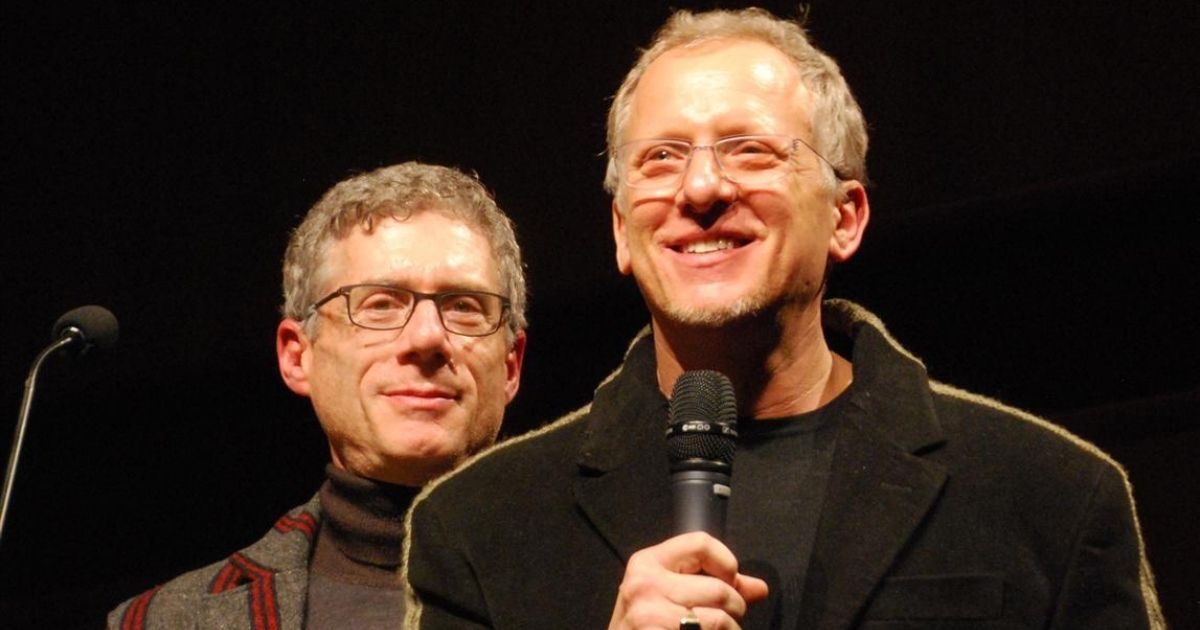Another Pride Month is just about over, but there’s one day left. The greatest possible way you could spend this night? Rocking out to Taylor Mac’s 24-Decade History of Popular Music, one of the best documentaries of the year and certainly the most musically unique. The film explores an event put on by the multi-hyphenate artist Taylor Mac in which Mac spent 24 hours performing a stage show with music, costumes, and banter that chronologically depicted the history of America. It was a bold, draining, powerful, and damn entertaining piece of performance art, and the legendary documentarians Rob Epstein and Jeffrey Friedman have made a brilliant film about it.
Epstein and Friedman are icons in the documentary space (though they’ve also directed narrative features like Lovelace and Howl), having begun in the late ’70s with extremely compelling queer documentaries that were unfortunately ahead of their time. The directing duo have won two Academy Awards and three Peabody Awards for their early classics The Life and Times of Harvey Milk, Common Threads, and The Celluloid Closet. They’ve also had a passion for music, especially recently with the Grammy Award-winning documentary Linda Ronstadt: The Sound of My Voice, not to mention Epstein’s solo film about musician Eddie Gomez.
Those passions collide in Taylor Mac’s 24-Decade History of Popular Music, an exhilarating, enlightening good time. Part biopic, part concert film, part queer study of American history, the film is a must-watch, even if audiences don’t get to it tonight; the HBO Documentary Film is streaming on Max. Epstein and Friedman spoke about the film and their Pride Month with MovieWeb.
A 24-Hour Performance Exploring American History
Back in 2016, with one of the most uncomfortable and hopeless presidential elections in American history, MacArthur Genius Fellow and Pulitzer Prize finalist Taylor Mac brought a bombastic, drag-heavy, musically complicated historical rock opera of sorts to a live audience at St. Ann’s Warehouse in Brooklyn. For 24 hours straight (or not so straight). The queer artist and Mac’s amazing team reinterpreted American history like an LGBTQ+ Howard Zinn, using music and elaborate, decade-specific wardrobes to tell the story of how the collective ‘we’ got to here.
“The concert performance was captured in real time, back in 2016 and 2017,” explained Epstein. “They realized this was a one-time opportunity to capture the live 24-hour performance, so Taylor and his producers at the very last minute got together a crew headed up by the world renowned cinematographer Ellen Kurass. So that was in the can, and then when he mounted the show in Los Angeles, which he did over four nights, they had the opportunity to do a more planned out production and capture that performance with eight cameras. So that was already done.” He continued:
By the time Jeffrey and I came onto the project, we had that material to work with, and then we decided that there really needed to be another level to the storytelling, which was more behind the scenes because none of that was filmed at the time. So Taylor and Machine Dazzle, the costume designer, were doing a photo shoot. We thought, well, this would be a great opportunity to film behind the scenes moments when they’re getting into costume and talking, and talk with them about the creation of the show. And it was about a 10-month process of production and editing.
Taylor Mac Joins Rob Epstein and Jeffrey Friedman’s Filmography
What was it about Taylor Mac’s performance that attracted Epstein and Friedman, preeminent chroniclers of LGBTQ+ history? They’d previously tackled such important subjects and historical moments as the election and death of Harvey Milk, the AIDS Memorial Quilt, the Nazis’ criminalization of homosexuality, and the history of closeted gay actors in Hollywood; heavy, big topics. How do Epstein and Friedman choose them, and why Mac?
“I think the starting point for us with any project, why we’re drawn to the subjects that we’re drawn to, is a sense of something that hasn’t been told that needs to be told, and that somehow we have something to say about that,” explained Epstein. “And Taylor Mac certainly fits into that kind of paradigm. You know, Taylor’s well known in the New York theater world, within the international theater community, but certainly hasn’t yet had the exposure that an HBO presentation will give him and his work.” He continued:
The show, this queer-lensed telling of American history through the duration of popular song, has a lot to say. It’s really an important message and ultimately, it’s a very humanistic one. It’s very specific, and it’s telling an American history along the way, through his queer lens. But ultimately, it’s just a very humanistic view of the world, and an expansive, generous one. So I think that’s why we were so drawn to Taylor and to the show, and the idea of presenting it as a feature documentary.
“You know, I think that that says it pretty well,” added Friedman. “I guess I would just add that I feel like our work and Taylor’s work is very harmonious in a way, that we’re interested in some of the same themes and some of the same subjects. We’re all storytellers, and we’re interested in history as Taylor is, and we’re interested in looking at history and telling parts of history that aren’t normally told or heard. So it just felt like a really, really good partnership.”
Music Documentaries and Queer History
About that history. A living textbook, a dynamic, organic study, Taylor Mac’s performance is experimental and educational in equal measure. At the beginning of the film, Mac mentions that the show is about filtering history through one queer body. How do you capture that cinematically?
“Well, Taylor’s looking at history and expressing it through a queer body, he’s filtering it through a queer lens,” explained Friedman, “that’s what it means to me. You know, history has traditionally not been told from a queer perspective. It’s mostly been told from a straight white male perspective.” He went on:
And I think Taylor’s intention was to reclaim that history and tell it from the perspectives of people who are not necessarily the winners. They say history is written by the winners. I think Taylor’s project is to make the rest of us winners.
“It’s also very literal,” added Epstein. “And that was something we liked to set up in the beginning, that literally it is his body that’s going to be performing this epic history as a one-person performance, even though there’s a big cast and maybe production numbers, he’s on stage for the entire duration of the show.”
And what a show it is. A mentioned before, Epstein and Friedman are becoming more interested in music’s intersectional and storytelling potential, another reason why Mac’s performance attracted them.
“We’ve been wanting to make a music documentary for a long time, and when the idea was to make the Linda Ronstadt film, that seemed like a great subject. And not only is she a wonderful human being and an interesting subject for a film, but her music is great, and her talent is amazing,” said Friedman. “We had a great experience when we were making that film. It was just great to be hearing that music all day. And it was great not to be working on something that was really depressing. So I think we enjoyed it, so we wanted more. And Taylor offered us another opportunity to work with music.”
“Music communicates on a whole other level,” added Epstein. “And the fact that we did the Linda Ronstadt film was proof of concept to Taylor and his producers that we could do a music film. We’re also working on another music film as well, a film following some young Cuban musicians.”
How to Celebrate Pride
So it’s the last day of Pride Month, and you know have more reasons than you’d need to celebrate the LGBTQ+ community and history with this film. Epstein and Friedman would do the same, and their film represents a sort of ideal way to treat Pride Month and carry it into the rest of the year.
I think the celebrations are a given, and that’s what’s marketed and what’s out there,” said Epstein of how to celebrate Pride. “I would say, some reflection time, you know, that we need to really spend some time reflecting on our history and our collective past and what’s been lost and what’s been gained. I think sometimes that gets a little buried in the expectations of Pride.”
“It’s a good time to reflect on the people who are being targeted now by the right for political purposes,” added Friedman. “Trans people, and for some reason, drag queens, in particular, are coming under attack. And I think as a community, it’s important to support the most vulnerable among us. You know, every time there’s progress, there’s a reaction. We’re in a period of reaction now. And I think it’s important that gay people, that queer people not allow those forces to divide the community. If we really feel connected to one another, then we’re going to support one another.”
Support Epstein, Friedman, and the community by streaming Taylor Mac’s 24-Decade History of Popular Music on Max tonight or anytime.
Stay connected with us on social media platform for instant update click here to join our Twitter, & Facebook
We are now on Telegram. Click here to join our channel (@TechiUpdate) and stay updated with the latest Technology headlines.
For all the latest Education News Click Here


